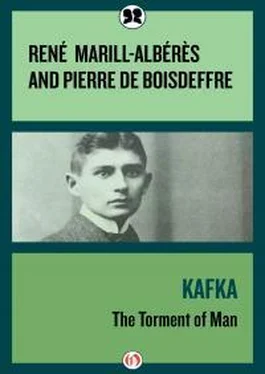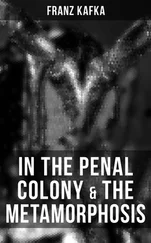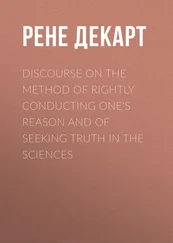From our sullied point of view, we are in the situation of travelers on a train who have been held back in a long tunnel by an accident; the tunnel has a section in which the light from the entrance is no longer visible and the light from the exit is so tiny that it must constantly be sought out only to be lost from sight; during all this time both the entrance and the exit are uncertain. 14
On leaving his burrow, the creature finds that light and life around him contribute nothing new but condemn him to wander endlessly. The world is long, time is short.
My grandfather used to say, “Life is astonishingly short.” As I look back on it, life seems so foreshortened that I can hardly understand how a young man can resolve to set out on horseback for the next village without fearing that—not to mention accidents—even the span of a normal life untroubled by mishaps may fall short of the time needed for such a ride. 15
Then there appears in the thematic structure of Kafka’s imaginative work the symbol of an eternally unfinished world, the world of Babel, which men do not know how to construct and which God abandons. “In the beginning, when they started to build the Tower of Babel, everything went along fairly well; there was even too much order; too much talk of signposts, interpreters, workers’ housing, means of communication.” The construction of the universe was diverted from its end; instead of building the tower of Heaven and Earth, the workmen’s city was first laid out, and the men argued over their quarters.
Between two wars, they worked to beautify the city, and this in turn provoked new outbursts of jealousy which resulted in new struggles. That was how the first generation spent their time; and nothing has changed since! 16
We rediscover Babel in a world without communications described in The Great Wall of China . In the nameless village lost in the vast regions of Asia, distances are measureless: “We have some news from here and there concerning border wars, but almost nothing concerning the capital.” Yet the distant capital determines the fate of these isolated men though it is a myth which may no longer exist: “In the last century the capital itself was destroyed; a new one was established some distance from it, then the latter was in turn destroyed and the old one reconstructed, yet this did not have the slightest repercussion on the life of our little town!”
Kafka’s Chinese obey orders issued by a power which perhaps no longer exists, just as we now study the light which issued from a star which is perhaps already dead and which has taken a thousand years to reach us.
The Great Wall of China immerses man in the relativity of time and space: what is true here and now was so long in reaching us that its source is superannuated. But what is to be done about it? If the distant powers were questioned concerning their intentions, the messenger would arrive after their death. Man imprisoned himself in an individual universe; now he disintegrates in a world that is too vast. And still soldiers arrive, workers are recruited, and for reasons unknown the Great Wall of China is built: “The works accomplished rival those associated with the Tower of Babel …” Superimposed on the theme of a world without communications, dissolved in space, is the theme of the great unfinished construction.
It is in this universe that man works assiduously, errs, loses his way. His need of logic is never satisfied, his hope of identifying a goal is forever vanishing. “A man from the country appears and asks to be admitted to the law. But the guard tells him that for the moment he cannot grant him admission.” The man reflects, then asks if he will be granted admission later. “That is possible,” says the guard, “but not now.” 17
But what is it that deprives this world of clarity? Is it human failure or God’s silence? Why is this world illogical? It seems sometimes—when Kafka depicts the stupidity of subordinates, the confusion of the business world, the impossibility of obtaining exact information, the intangibility of regulations—that the absurd represents a failure on the part of men. Because they have fallen—that is, from the Gnostic point of view, become immersed in matter (and in Bureaucracy!)—God does not reveal himself to them. Most of the sketches written between 1917 and 1924, several of them contemporaneous with The Castle , suggest that God has abandoned the world common to men and not the individual himself. Our own presumption causes us to place ourselves in a false situation.
They have to make a choice: they have to become kings or messengers of kings. Like children they all choose to become messengers; they rove the world and, since there are no kings, shout to each other tidings which have become absurd. They would gladly end their miserable existence but dare not because of their pledge of fidelity. 18
But in The Trial it is the individual who feels not only that he is crushed by a badly organized society but also that he is fundamentally guilty. And in The Castle the Absolute and the Transcendent take refuge behind a wall of silence and misunderstandings.
NOTES
1. Diary .
2. Diary , October 21, 1911.
3. Diary , November 9, 1911.
4. “In Our Synagogue.” From the collection Beim Bau der chinesischen Mauer (Berlin: Kiepenheuer Verlag, 1931). Partially translated into French by Jean Carrive (Seghers, 1944) and by Carrive and A. Vialatte (Gallimard, 1950).
5. Diary , December 16, 1910.
6. Diary , August 15, 1911.
7. “The Neighbor.” From the collection Beim Bau der chinesischen Mauer .
8. Notebooks , November 18, 1917.
9. “The Examination.” From the collection Beim Bau der chinesischen Mauer .
10. From the Notebooks . French translation in “Cahiers divers et feuilles volantes,” in Préparatifs de noce à la campagne (Paris; Gallimard, 1957), pp. 209-358.
11. “Meditations on Sin, Suffering, Hope and the True Way.” French translation in Préparatifs de noce à la campagne, op. cit ., pp. 35-62.
12. “Little Fable.” From the collection Beim Bau der chinesischen Mauer .
13. “The Burning Bush.” Ibid .
14. Notebooks , October 20, 1917.
15. “The Next Village.” From the collection Ein Landartz (Leipzig: Wolf, 1919). French translations by Alexandre Vialatte in La Métamorphose (Gallimard, 1955) and Un médecin de campagne (1952).
16. “The Arms of the City.” From the collection Beim Bau der chinesischen Mauer .
17. “Before the Law.” From the collection Ein Landartz .
18. Notebooks , December 2, 1917.
V
THE SURVIVOR
LONELINESS, CREATION, AND
THE PROSPECT OF DEATH
THE LAST LOVE AFFAIR
SICKNESS, DEATH, AND SURVIVAL
(1921-1924)
Desire for solitude approaching loss of consciousness. Alone with myself .
After 1920 the “Metamorphosis” was accomplished. “I became someone else .” The man Kafka wasted away in order to facilitate the growth of the fabulous animal—the only creature capable of crossing over the “last terrestrial frontier” and recording what happens in the other world . Kafka did not decide to live with Milena, and his meeting with Dora Dymant—the last feminine mediation—came too late to accomplish the miracle of linking him to other men. It would seem that he abandoned himself, giving up his carnal husk in preparation for death. But he intended to die with his eyes open; he was less concerned with surviving through an operation in which he scarcely believed than with living again in another world to which he was drawing nearer each day. Life seemed clearly to continue, but “liberation” was approaching. In 1919 and 1920 the Diary , truly a Wild Ass’s Skin , 1is reduced to a few decisive lines. “The presentiment of a definitive liberation is by no means refuted by the fact that, the next day, captivity continues without change or worsens,” he writes, “or even by the explicit statement that captivity will never cease. All of this, on the contrary, may be a necessary precondition of definitive liberation” (January 9, 1920).
Читать дальше












